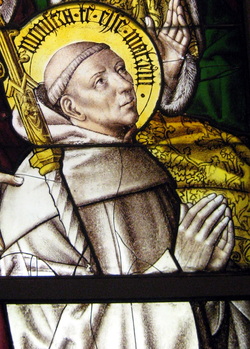
He was a burning and shining light of lowliness, mercifulness, and kindness. His concentration of thought was such, that he hardly used his senses except to do good works, in which latter he acted with admirable wisdom. Thus occupied, he refused the Bishoprics of Genoa, Milan, and others, which were offered to him, declaring that he was unworthy of so high a sphere of duty. Being made Abbot of Clairvaux he built monasteries in many places, wherein the excellent rules and disciplines of Bernard long flourished. When Pope Innocent II restored the monastery of St. Vincent and St. Anastasius at Rome, Bernard set over it the Abbot who was afterwards the Supreme Pontiff Eugene III, and who is also the same to whom he addressed his book upon Consideration.
He was the author of many writings, in which it is manifest that his teaching was rather given him of God, than gained by hard work. In consequence of his high reputation for excellence, he was called by the most exalted Princes to act as arbiter of their disputes, and for this end, and to settle affairs of the Church, he often went to Italy. He was an eminent helper to Pope Innocent II, in putting down the schism of Peter Leoni, and worked to this end, both at the Courts of the Emperor and of Henry, King of England, and in the Council of Pisa. He fell asleep in the Lord in the sixty-third year of his age. He was famous for miracles, and Pope Alexander III numbered him among the Saints. Pope Pius VIII, acting on the advice of the Congregation of Sacred Rites, declared and confirmed St. Bernard a Doctor of the Universal Church. He also commanded that all should use the Mass and Office for him as for a Doctor, and granted perpetual yearly plenary indulgences to all who should visit Churches of the Cistercian Order upon the Feastday of this Saint.




